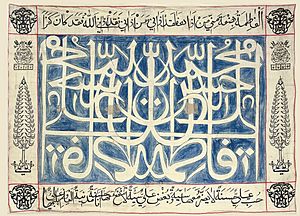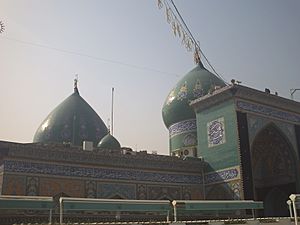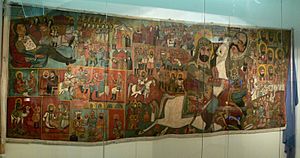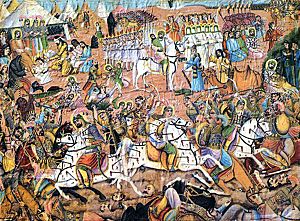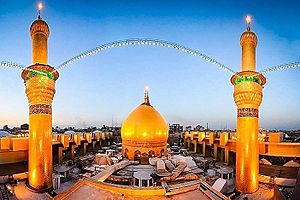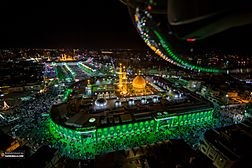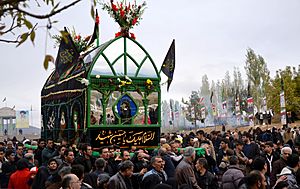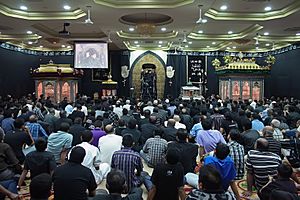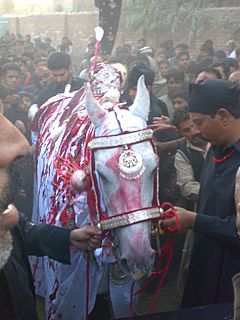Husayn ibn Ali facts for kids
Quick facts for kids Husayn ibn Aliالحسين بن علي |
|
|---|---|
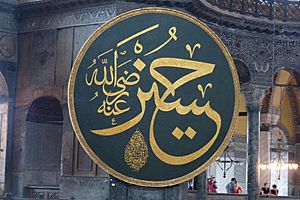
Calligraphic seal featuring Husayn's name, on display in the Hagia Sophia
|
|
| Religion | Islam |
| Known for |
|
| Personal | |
| Born | 10 January 626 (3 Sha'ban AH 4) Medina, Hejaz, Arabia |
| Died | 10 October 680 (aged 54) (10 Muharram AH 61) Karbala, Umayyad Caliphate |
| Cause of death | Martyred at the Battle of Karbala |
| Resting place | Imam Husayn Shrine, Karbala Governorate, Iraq 32°36′59″N 44°1′56.29″E / 32.61639°N 44.0323028°E |
| Spouse |
|
| Children |
|
| Parents |
|
| Relatives |
List
Muhammad (maternal grandfather)
Hasan (full brother) Zaynab (full sister) Umm Kulthum (full sister) Muhsin (full brother) Hilal (paternal half-brother) Abbas (paternal half-brother) Abdullah (paternal half-brother) Ja'far (paternal half-brother) Uthman (paternal half-brother) Muhammad ibn al-Hanafiyya (paternal half-brother) Zaynab (maternal aunt) Ruqayya (maternal aunt) Umm Kulthum (maternal aunt) Umama (maternal cousin and step-mother) |
| Senior posting | |
| Title |
List
Sayyid al-Shuhada (Arabic for Master of martyrs) ash-Shahīd (Arabic for The Martyr) as-Sibt (Arabic for The Grandson) Sayyidu Shabābi Ahlil Jannah (Arabic for Leader of the Youth of Paradise) ar-Rashīd (Arabic for The Rightly Guided) at-Tābi li Mardhātillāh (Arabic for The Follower of God's Will) al-Mubārak (Arabic for The Blessed) at-Tayyib (Arabic for The Pure) Sayyidush Shuhadā (Arabic for Master of the Martyrs) al-Wafī (Arabic for The Loyal) Üçüncü Ali (Turkish for Third Ali) |
| Monuments |
|
| Other names |
|
| Opponent(s) | Yazid I |
Husayn ibn Ali (born January 10, 626 – died October 10, 680) was a very important figure in early Islamic history. He was the grandson of the Islamic prophet Muhammad. His parents were Ali ibn Abi Talib and Muhammad's daughter Fatima. Husayn was also the younger brother of Hasan ibn Ali. Many Muslims, especially Shia Muslims, see him as the third Imam (a spiritual leader) after his brother Hasan. He is a member of the Ahl al-Bayt, which means "People of the House" of Prophet Muhammad. Muhammad called Husayn and his brother Hasan "the leaders of the youth of Paradise."
During his father Ali's time as a leader, Husayn joined him in battles. After Ali was killed, Husayn supported his brother Hasan's peace treaty with Mu'awiya. For nine years, Husayn and Hasan lived quietly in Medina, staying out of politics. When Hasan died, people in Iraq wanted Husayn to lead an uprising. But Husayn told them to wait as long as Mu'awiya was alive, because of the peace treaty.
Before Mu'awiya died, he chose his son Yazid to be the next leader. This went against the peace treaty. When Mu'awiya died in 680 CE, Yazid demanded that Husayn promise loyalty to him. Husayn refused. He left his hometown, Medina, and went to Mecca for safety. People from Kufa (a city in Iraq) sent him letters, asking him to come and be their leader.
On his way to Kufa with about 70 followers, Husayn's group was stopped by Yazid's army. They were forced to go to a place called Karbala on October 2. A larger army of 4,000 soldiers arrived. Talks failed because Husayn would not promise loyalty to Yazid. A battle happened on October 10, where Husayn and most of his family and friends were killed. His family members who survived were taken prisoner. This event led to a big conflict known as the Second Fitna.
The Battle of Karbala was a turning point for the group who supported Ali (called Shi'at Ali). It helped them become a distinct religious group with their own traditions. This event is very important in Shia history and beliefs. For Shias, Husayn's suffering and death show the struggle for what is right against what is wrong. It also gives them examples of heroic actions. The battle is remembered every year during the Islamic month of Muharram. This period ends on the tenth day, called Ashura. On this day, Shia Muslims mourn, hold processions, and gather for religious events. Many Muslims, both Shia and Sunni, see Husayn and his companions as martyrs.
Contents
- Husayn's Early Life
- Husayn During Early Islamic Rule
- Husayn with Ali and Hasan
- Husayn During Mu'awiya's Rule
- Husayn's Uprising
- Husayn's Tomb
- Commemorating Husayn
- Husayn's Family Life
- Husayn's Personality
- Husayn in Religious Texts
- Husayn's Works
- Different Views on Husayn
- Impact of Husayn's Story
- In Art and Literature
- Images for kids
- See also
Husayn's Early Life
Husayn was born in Medina on January 10, 626 CE. He was still a child when his grandfather, Prophet Muhammad, passed away. Husayn was the younger son of Ali, Muhammad's cousin, and Fatima, Muhammad's daughter. Both his parents were from the Banu Hashim clan. Muhammad himself gave Husayn and his brother Hasan their names. To celebrate Husayn's birth, Muhammad sacrificed a ram.
Muhammad's Love for Husayn
Husayn grew up in Muhammad's home. The family of Ali and Fatima was often praised by Muhammad. In important events, Muhammad called this family the ahl al-bayt, meaning "People of the House." The Qur'an also praises the ahl al-bayt.
Many stories show Muhammad's deep love for Hasan and Husayn. He would carry them on his shoulders or hold them close. Some sayings of Muhammad include: "Whoever loves them loves me, and whoever hates them hates me." Another famous saying is: "Al-Hasan and al-Husayn are the masters of the youth of Paradise." This saying is very important for Shias, as it supports the idea of their leadership. It is also said that Muhammad gathered Ali, Fatima, Hasan, and Husayn under his cloak and declared them pure from sin.
Muhammad also spoke about the future event at Karbala. For example, he gave a small bottle of soil to Umm Salama. He told her that the soil would turn into blood after Husayn was killed.
The Event of Mubahala
In the year 631–632 CE, a group of Christians from Najran visited Muhammad. They came to discuss their beliefs about Jesus. In the Qur'an, a verse about this event mentions "our sons," "our women," and "ourselves."
Shia Muslims believe "our sons" refers to Hasan and Husayn. "Our women" refers to Fatima, and "ourselves" refers to Ali. Many Sunni historians also agree that Muhammad, Fatima, Hasan, and Husayn were part of this event. This event is why they are sometimes called the "Family of the Cloak."
Husayn During Early Islamic Rule
During the time of the first two leaders, Abu Bakr and Umar, Husayn was present at some events. He even spoke up when Umar was giving a speech from Muhammad's pulpit.
Later, during the time of Uthman, Husayn defended Abu Dharr al-Ghifari. Abu Dharr had spoken against some powerful people and was going to be sent away from Medina. Ali asked Hasan and Husayn to protect Uthman during a siege. Some reports say Husayn was even wounded while trying to defend Uthman.
Husayn with Ali and Hasan
When Ali became the leader, Husayn was one of his closest supporters. He stayed with his father and joined him in battles.
After Ali was killed, people pledged loyalty to Hasan. But Mu'awiya did not accept Hasan's leadership and prepared for war. To avoid a civil war, Hasan signed a peace treaty with Mu'awiya. The treaty stated that Mu'awiya would not name a successor. Instead, the Muslim community would choose the next leader.
At first, Husayn did not agree with this treaty. But Hasan convinced him to accept it. Later, some Shia leaders wanted Husayn to attack Mu'awiya. Husayn refused, saying he would follow the treaty as long as Mu'awiya was alive. He said he would think about it again after Mu'awiya's death. After the treaty, Mu'awiya broke its promises and insulted Ali. Husayn wanted to respond, but Hasan stopped him and gave a speech himself. Husayn kept his promise to the treaty even after Hasan died.
Husayn During Mu'awiya's Rule
For Shia Muslims, Husayn was the third Imam for ten years after his brother Hasan died in 670 CE. Most of this time was during Mu'awiya's rule.
Hasan and Husayn lived quietly in Medina, staying away from politics. Sometimes, groups from Kufa would visit them, asking them to be their leaders. But Hasan and Husayn refused.
When Hasan was poisoned, he did not tell Husayn who he suspected. He likely feared it would cause more bloodshed. After Hasan's death, people in Iraq again asked Husayn to lead an uprising. Husayn told them to wait as long as Mu'awiya was alive, because of the peace treaty.
Later, Mu'awiya tried to make people pledge loyalty to his son, Yazid. Husayn was one of five important people who refused. This was because appointing a successor went against the peace treaty Hasan had made with Mu'awiya. Before Mu'awiya died in April 680, he warned Yazid that Husayn might challenge his rule. He told Yazid to be careful with Husayn and not to harm him, since he was Muhammad's grandson.
Husayn's Uprising
Refusing Yazid's Rule
After Mu'awiya died on April 22, 680 CE, Yazid ordered the governor of Medina to force Husayn to pledge loyalty. Yazid wanted to control the city quickly. Husayn refused to pledge loyalty in secret. He said it should be done in public.
The governor was hesitant to act against Husayn because of his close relation to Muhammad. A few days later, Husayn left Medina for Mecca without pledging loyalty to Yazid. He stayed in Mecca from May to September 680 CE. His family, including his wives, children, and brothers, joined him.
Invitations from Kufa
Husayn had many supporters in Kufa. This city had been the capital when his father and brother were leaders. The people of Kufa were unhappy with Yazid's rule, which they felt was unfair. While in Mecca, Husayn received letters from Kufans. They told him they were tired of the Umayyad rulers and had no rightful leader. They asked him to lead a revolt against Yazid.
Husayn wrote back, agreeing that a true leader follows the Qur'an. He promised to guide them rightly. He sent his cousin, Muslim ibn Aqil, to Kufa to check the situation. Ibn Aqil found strong support and told Husayn to come. But Yazid replaced the Kufa governor with Ubayd Allah ibn Ziyad. Ibn Ziyad quickly suppressed the revolt, and Ibn Aqil was killed.
Husayn did not know about these changes in Kufa. He decided to leave Mecca. Some friends advised him not to go to Iraq, or at least not to take his family. But Husayn refused, saying he did not want bloodshed in Mecca's holy place.
Journey to Karbala
Husayn insisted on going to Kufa, despite warnings. He wrote a famous letter explaining his reasons: "I did not go out for fun or selfishness, or for corruption and oppression. Instead, my goal is to correct the wrongs in my ancestors' nation. I want to command good and forbid evil, following my grandfather's tradition and my father Ali's way."
Husayn left Mecca on September 10 or 12, 680 CE. He took about 50 men from his family and friends, along with women and children. On the way, he heard about Ibn Aqil's death and the Kufans' change of heart. He told his followers they could leave, but his close companions stayed with him.
Husayn met different people on his journey. A poet named Farzadaq told him that the Kufans' hearts were with him, but their swords were with the Umayyads. Husayn's decision remained firm. He said that things were in God's hands.
Near Kufa, Husayn's group was stopped by 1,000 soldiers led by Hurr ibn Yazid. Husayn showed them the letters from Kufans, but Hurr denied knowing about them. Hurr said Husayn must go to Ibn Ziyad. Husayn refused. Hurr would not let Husayn enter Kufa or return to Medina.
Ibn Ziyad ordered Hurr to force Husayn's group to stop in a desolate place without water. Husayn refused to start a fight. On October 2, 680 CE, Husayn arrived at Karbala, a desert plain north of Kufa, and set up camp.
The next day, a 4,000-strong army arrived under Umar ibn Sa'd. He was ordered to make Husayn surrender. Ibn Ziyad also ordered that Husayn and his companions be denied access to the Euphrates river. Husayn's group went without water for three days. Then, a group of fifty men led by his half-brother Abbas managed to get some water.
Husayn and Ibn Sa'd tried to negotiate. It was said that Husayn offered to return to Medina, or go to a border post to fight for Muslims. But Ibn Ziyad, influenced by Shemr ibn Ziljawshan, refused any peaceful solution. Ibn Ziyad ordered Ibn Sa'd to attack Husayn if he refused to surrender. Ibn Sa'd agreed to carry out the orders.
On the evening of October 9, the army moved towards Husayn's camp. Husayn asked for one night to think and pray. He told his men they were free to leave under the cover of night, as the enemy only wanted him. Very few left. Husayn's followers prepared their defense. They tied their tents together and dug a ditch behind them, ready to be set on fire. Husayn and his companions spent the night praying.
The Battle of Karbala
On October 10, after morning prayers, both sides prepared for battle. Husayn's group had about 32 horsemen and 40 foot soldiers. Ibn Sa'd's army had 4,000. The ditch behind Husayn's tents was set on fire to protect their rear.
Husayn gave a speech, reminding his opponents that he was Muhammad's grandson. He asked to be allowed to leave, but he was told he must surrender to Yazid. Husayn refused. His speech moved Hurr, the leader of the first army, to switch sides and join Husayn.
After Husayn's speech, his companion Zuhayr ibn Qayn tried to convince Ibn Sa'd's soldiers not to kill Husayn, but it was useless. The Umayyad army began to fire arrows. Then, duels took place, and several of Husayn's companions were killed. The fighting continued with attacks and counter-attacks. Husayn's cavalry fought bravely. When their horses were wounded, they dismounted and fought on foot.
Ibn Sa'd ordered the tents to be burned. All but one, where Husayn and his family were, were set on fire. This plan backfired, as the flames blocked the Umayyad advance for a while. After noon prayers, Husayn's companions were surrounded, and almost all were killed. Husayn's relatives then joined the fight. His son Ali Akbar was killed. Then his half-brothers, including Abbas, and other family members were slain. At one point, a young child of Husayn's, sitting on his lap, was hit by an arrow and died.
Husayn's Death
During the battle, the Umayyad soldiers hesitated to attack Husayn directly. He was wounded while trying to get water. Later, he was surrounded and wounded by Malik ibn Nusayr.
Shemr advanced with foot soldiers towards Husayn, who had few people left. A young boy from Husayn's camp ran to him, trying to defend him from a sword strike, and was injured. Husayn's sister Zaynab saw this and cried out to Ibn Sa'd, asking if Husayn would be killed while he watched. Ibn Sa'd wept but did nothing. Husayn is said to have killed many attackers. The soldiers were still unwilling to kill him. Finally, Shemr shouted at them to kill him. The Umayyad soldiers then rushed Husayn and wounded him. He fell to the ground, and an attacker named Sinan ibn Anas killed him.
Aftermath of the Battle
About 70 or 72 people died on Husayn's side. Around 20 of them were descendants of Abu Talib, Ali's father. This included two of Husayn's sons and many other relatives. After the battle, Husayn's clothes, sword, and belongings were taken. The women's jewelry and cloaks were also seized. Shemr wanted to kill Husayn's only surviving son, Ali Zayn al-Abidin, who was ill. But Ibn Sa'd stopped him.
Husayn's family was sent to Ibn Ziyad, and then to Yazid. The women of Yazid's household joined the captive women in mourning. After some years, the women were given back their belongings and sent back to Medina.
The killing of Muhammad's grandson shocked the Muslim community. Yazid's reputation suffered, and people felt he was not a good leader. Before Karbala, the Muslim community was divided politically. But Karbala gave the pro-Ali group a strong religious identity. It helped them become a distinct religious group. For Shias, Husayn's death was a "big bang" that started and shaped their faith.
Related Uprisings
Some supporters of Ali in Kufa felt guilty for abandoning Husayn. To make up for it, they started a movement called Tawwabin uprising, led by Sulayman ibn Surad. They wanted to fight the Umayyads. This movement gained much support but was defeated in January 685 CE.
After the Tawwabin's defeat, Mukhtar al-Thaqafi took over the leadership of the pro-Ali groups in Kufa. In October 685, Mukhtar and his supporters took control of Kufa. He executed those involved in killing Husayn, including Ibn Sa'd and Shemr. Mukhtar's general, Ibrahim ibn al-Ashtar, defeated an Umayyad army, and Ibn Ziyad was killed. Mukhtar himself was killed in April 687.
Husayn's Tomb
Husayn ibn Ali's tomb is in Karbala, about 90 km southwest of Baghdad. This tomb was built and expanded over centuries. At first, it was just a simple marker. Later, a monument was built, and the city of Karbala grew around it.
There are different stories about where Husayn's head was buried. Some say it was with his father Ali in Najaf, or in Karbala with his body. Others say it was in Damascus, Raqqa, or Cairo.
Commemorating Husayn
Shia Muslims believe visiting Husayn's tomb brings blessings. The first visit is said to have been by Husayn's son Ali Zayn al-Abidin and his family. The first recorded visit was by Sulayman ibn Surad and the Penitents. They mourned and stayed by the tomb. This tradition grew over time. Special visits happen on 10 Muharram (Ashura Pilgrimage) and 40 days after (Arba'een Pilgrimage). The soil of Karbala is believed to have healing powers.
Mourning for Husayn is very important for Shias. It reminds them of his suffering and is seen as a way to gain salvation. After Husayn's death, his sister Zaynab cried out when she saw his body. This is considered the first act of mourning for Husayn. His son Zayn al-Abideen is said to have spent his life weeping for his father.
Special gatherings called majalis are held in places called husayniyya. In these gatherings, the story of Karbala is told, and sad poems are recited.
During Muharram, public processions are held to remember the Battle of Karbala. These processions started in the tenth century. Participants walk barefoot through the streets, mourning and beating their chests. Sometimes, chains are used to cause physical pain. In South Asia, a horse called zuljenah, representing Husayn's battle horse, is led riderless through the streets. In Iran, plays called taziya show scenes from the battle.
Most of these rituals happen during the first ten days of Muharram, ending on the tenth day. These rituals help strengthen the identity and memory of the Shia community. They also provide "life models and norms of behavior" for Shias. Some Shia scholars have criticized self-flagellation rituals, as they are seen as harmful.
Husayn's Family Life
| Ḥusayn ibn 'Alī | |
|---|---|
| Shiism: Imam; Proof of God, The Martyr of Martyrs, Master of the Martyrs All Islam: Ahl al-Bayt, Ṣaḥābī, Martyr;Master of the Youths of Paradise |
|
| Venerated in | All Islam (Salafis honour rather than venerate him). |
| Major shrine | Imam Husayn Shrine, Karbala, Iraq |
Husayn's first wife was Rubab. She was the daughter of a tribal chief. Husayn had a daughter named Sakinah with Rubab. He loved Rubab and Sakinah very much. Rubab later had a son named Abd Allah (also known as Ali al-Asghar). Husayn's nickname, Abu Abd Allah, likely refers to this son. After Husayn's death, Rubab mourned him for a year and never remarried.
Husayn had two sons named Ali. The older one, Ali ibn Husayn Zayn al-Abidin, became the fourth Shia Imam. He was 23 when his younger brother, Ali al-Akbar, was killed at Karbala at age 19. Ali al-Akbar's mother was Layla. Zayn al-Abidin's mother was a slave girl, often believed by Shias to be the daughter of the last Sassanid king of Iran.
Another wife of Husayn was Umm Ishaq. She had been married to Hasan before. Hasan asked Husayn to marry her after he died. Husayn did, and they had a daughter named Fatima.
Hasan and Husayn were the only male descendants of Prophet Muhammad from whom future generations were born. So, anyone who traces their family line back to Muhammad is related to either Hasan or Husayn.
Husayn's Personality
Husayn had a fair complexion and sometimes wore a green or black turban. He often spent time with the poor or invited them to his home to feed them. Mu'awiya said that Husayn and his father Ali were honest.
Husayn was known for being tolerant, humble, and eloquent. He showed great courage and disliked a life of shame. Many stories describe Husayn and his brother Hasan as resembling Prophet Muhammad. Some say Husayn was more like his father Ali, while Hasan was more like Muhammad.
Husayn was very generous in Medina. He would free his slaves and maids if they showed good behavior. There is a story that Muawiyah sent a maid to Husayn with many gifts. When the maid spoke about the temporary nature of the world, Husayn freed her and gave her all the gifts. Once, a slave made a mistake, but Husayn forgave him and set him free. Husayn was known to give away property he inherited even before receiving it. He also gave a large sum of money to his children's teacher, saying it could not fully repay the teacher's work. A man from Syria once cursed Husayn and Ali, but Husayn forgave him and treated him kindly. It is said that the marks from carrying food bags for the poor were visible on Husayn's body on the day of Ashura.
Husayn in Religious Texts
In the Qur'an
Many scholars believe certain verses in the Qur'an refer to Husayn and his family. For example, the chapter Al-Insan is thought to be about Ali, Fatima, and their children's illness and vow.
The event of Mubahala in the Qur'an describes a meeting between Prophet Muhammad's family and Christians. Many narrations say that "our sons" in this verse refers to Hasan and Husayn.
The Verse of Purification is also believed to refer to the Ahl al-Kisa (Ali, Fatima, Hasan, and Husayn), stating that God wishes to keep them pure.
Verse 23 of Surah ash-Shura talks about loving "nearness." Many scholars say this means loving the Ahl al-Bayt: Ali, Fatima, Hasan, and Husayn.
Verse 15 of Surah Al-Ahqaf speaks of a pregnant woman's pain. This is seen as a reference to Fatima, and the son as Husayn. God comforted Muhammad about Husayn's fate, which upset Fatima greatly.
Other verses are interpreted by Shias to mean the Imamate would continue through Husayn's family. Some verses are also linked to Husayn's uprising and martyrdom.
In the Prophet's Sayings
Husayn is mentioned in important sayings of Prophet Muhammad. In the "Thaqalayn" (Two Weighty Things), Husayn is part of the Prophet's family, who are to be followed. In other sayings, Husayn and Hasan are called "the masters of the youth of Paradise."
News of Husayn's Fate
Stories say that the angel Gabriel told Muhammad at Husayn's birth that his community would kill him. Muhammad then told his companions about Husayn's future death. Ali and Hasan also knew this. God had also informed earlier prophets about Husayn's killing. Ali knew Husayn would be killed in Karbala. He once stopped there, cried, and remembered Muhammad's prophecy. He explained that "Karbala" means "anguish" and "calamity." It is believed that those killed in Karbala will enter Paradise without judgment.
Husayn's Works
Husayn Ibn Ali left behind many narrations, speeches, and letters. These are found in both Sunni and Shia sources. His narrations can be divided into two periods: before and after he became an Imam. In the first period, he narrated sayings from his relatives and his own personal sayings.
His speeches include one after Ali's leadership began and another during the Battle of Safin. He also wrote a poem about the loss of his brother Hasan. During his time as Imam, he gave more speeches and wrote more letters. These include letters to Shias and to Mu'awiyah about the peace treaty and Yazid. A significant part of his speeches and letters are from the time of his uprising. This includes his letters to the people of Kufa and Basra.
Husayn also left behind prayers, advice, and poetry. These are collected in books like Al-Sahifa Al-Husayn. One of the most famous Shia prayers by Husayn is the Du'a Arafah. This beautiful prayer is recited every year on the Day of Arafah during the Hajj season.
Different Views on Husayn
Husayn's killing had a strong emotional impact on all Muslims. Sunnis remember it as a tragic event, and those killed with Husayn as martyrs. For Shia Islam, the impact was much deeper. Most Muslims honor Husayn because he was Muhammad's grandson and sacrificed himself for an ideal. Historian Edward Gibbon called the events at Karbala a tragedy. Mahatma Gandhi believed that Islam's progress came from the sacrifices of saints like Husayn.
Sunni Views
Sunnis generally have a positive view of Husayn. This is likely due to the sad stories collected by early historians. These stories often came from Kufans who regretted their actions towards Husayn. Some historians believe that the idea of "fatalism" (that everything is predetermined) caused Sunnis to see Husayn's actions as an illegal uprising, not a fight against corruption.
Shia Views
For Shias, the most important beliefs about Husayn are his Imamate and his qualities as an Imam. Shias believe Husayn, like other Imams, can help people connect with God. Through his help, followers can find guidance and salvation.
As a member of the holy five, he shares in divine grace, just like his brother Hasan and his grandfather Muhammad. Shias honor Husayn for his noble actions and the ideals he sacrificed himself for. They believe Imams know everything that has happened and will happen. So, Husayn knew his fate when he left Mecca for Kufa. He accepted his sacrifice without hesitation. This makes his actions even more valuable.
Husayn is remembered as the "prince of martyrs" (Sayyed al-Shuhada). The Battle of Karbala is seen as the ultimate example of suffering and martyrdom for Shias. It is believed that revenge for this suffering will be a main goal of the future revolution led by the twelfth Shia Imam, Muhammad al-Mahdi. When he returns, Husayn and his companions will be brought back to life, along with their killers, who will then be punished.
The saying "Every day is Ashura and every land is Karbala!" is a powerful reminder for Shias. It means they should live their lives with complete sacrifice for God and others, just as Husayn did on Ashura. It also means that the suffering of Karbala should always be remembered.
Husayn's Head in Isma'ilism
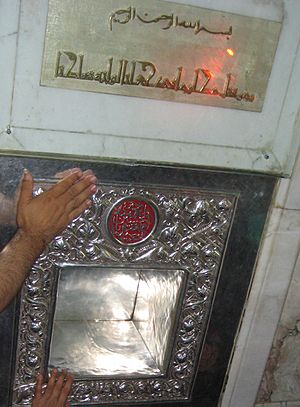
The Fatimid leader Badr al-Jamali found Husayn's head in Palestine in 1056 CE. He built a mosque and a shrine there, known as the Shrine of Husayn's Head. This shrine was considered very magnificent. The head stayed in Ashkelon until 1153 CE. Fearing the Crusaders, the ruler moved the head to Cairo. Today, Isma'ilis have built a marble platform at the original burial site in Ashkelon.
Modern Views on Husayn's Reasons
Some historians believe Husayn's revolt was a hasty and unprepared attempt by an ambitious person. They say he wanted to achieve great things but did little himself. They also suggest he wanted to turn back when it was too late. Others see Husayn as someone who disturbed public peace. Some historians view it as a political struggle for leadership.
However, many scholars believe Husayn was driven by his beliefs. They say he was convinced that Muhammad's family was chosen by God to lead the community. He felt it was his right and duty to seek this leadership. He was not seeking martyrdom but wanted to return when his expected support did not appear. Some scholars believe Husayn saw the Umayyad rule as unfair and wanted to guide the Islamic community back to the right path. Others suggest Husayn aimed for martyrdom from the start. He wanted to shock the Muslim community and show how unfair the Umayyad government was.
Impact of Husayn's Story
Politics
The first political use of Husayn's death was during Mukhtar's revolt. He took control of Kufa with the slogan "Revenge for Husayn." Later, the Abbasid rulers claimed to have avenged Husayn's death by overthrowing the Umayyads. They also encouraged Muharram rituals. The Buyids, a Shia dynasty, promoted public Muharram rituals to strengthen Shia identity. The Safavids, who made Shi'ism the official religion of Iran in 1501, used Karbala and Muharram rituals to spread their message and strengthen their Shia identity. The Qajars also supported Muharram rituals to improve relations between the government and the people.
Iranian Revolution
The story of Karbala and Shia symbols played a big part in the Iranian Revolution of 1979. Before the revolution, some thinkers gave Shia Islam a new meaning. They said it was about revolution and fighting against unfair rule. The Battle of Karbala and Husayn's death became a model for revolutionary struggle. They believed mourning should be replaced by political action to achieve Husayn's ideals.
During the revolution, Ruhollah Khomeini called the Iranian Shah, Mohammad Reza Pahlavi, the "Yazid of his time." Shia beliefs and symbols helped organize widespread resistance. Husayn's story provided a way to label the Shah's rule as evil. Khomeini wrote that Husayn's struggle at Karbala was a fight against unfair monarchy. So, opposition to the Shah was compared to Husayn's opposition to Yazid. Muharram gatherings became more political. The Islamic Republic that formed after the revolution has continued to support Muharram rituals. They encourage people to vote as a form of "political activism" like Husayn's. The spirit of martyrdom, inspired by Husayn's death, was also seen in Iranian soldiers during the Iran–Iraq war.
In Art and Literature
Literature
The 19th-century novel Bishad Sindhu (The Ocean of Sorrow) about Karbala became a famous Islamic epic in Bengali literature. The poet Muhammad Iqbal compared Husayn's sacrifice to that of Ishmael. He also compared Yazid's opposition to Husayn with Pharaoh's opposition to Moses. The poet Ghalib compared Husayn's suffering to that of Mansur al-Hallaj, a Sufi who was executed.
Maqtal Literature
Maqtal works tell the story of someone's death. While Maqatil have been written about others, the genre mostly focuses on Husayn's death.
Many Maqatil on Husayn mix history with legends. They include details about his miraculous birth and say that the universe was created on the day of Ashura. They claim Husayn performed miracles, like providing water and food, and killed thousands of attackers. Other stories say that when Husayn died, his horse cried and killed soldiers. The sky turned red and it rained blood. Angels, spirits, and animals wept, and all his killers met bad ends. Maqtal literature influenced later works in Persian, Turkish, and Urdu.
Marthiya and Rawda
When Shi'ism became Iran's official religion in the 16th century, rulers supported poets who wrote about Karbala. The marthiya (poems remembering the dead) became popular. Rawda and nawha are common forms of marthiya related to Karbala. Many Persian writers wrote romanticized versions of the battle. These influenced the popular text Rawdat al-Shuhada (Garden of Martyrs), written in 1502. This book helped develop rawda khwani, a ritual telling of the battle in gatherings.
Inspired by Rawdat al-Shuhada, the poet Fuzûlî wrote a shorter version in Ottoman Turkish. This influenced similar works in other languages. Urdu marthiya focuses on mourning the Battle of Karbala. Rulers in India supported Urdu marthiya recitations during Muharram. Famous Urdu poets also wrote marthiya. Some modern poets compare Karbala to a model for revolutionary struggle for a fair society.
Sufi Poetry
In Sufism, where giving up one's self for God is important, Husayn is seen as a model Sufi. The Persian Sufi poet Hakim Sanai called Husayn a martyr, higher than all others. Farid ud-Din Attar saw him as a perfect example of a Sufi who sacrificed himself for God's love. Jalal ud-Din Rumi believed Husayn's suffering at Karbala was a way to connect with God, and therefore a cause for joy, not just grief. The Sindhi Sufi poet Shah Abdul Latif Bhittai wrote about Husayn's death, seeing it as a sacrifice for God. The Turkish Sufi Yunus Emre called Husayn and Hasan "kings of Paradise."
Images for kids
See also
 In Spanish: Husáin ibn Ali para niños
In Spanish: Husáin ibn Ali para niños
 | May Edward Chinn |
 | Rebecca Cole |
 | Alexa Canady |
 | Dorothy Lavinia Brown |


